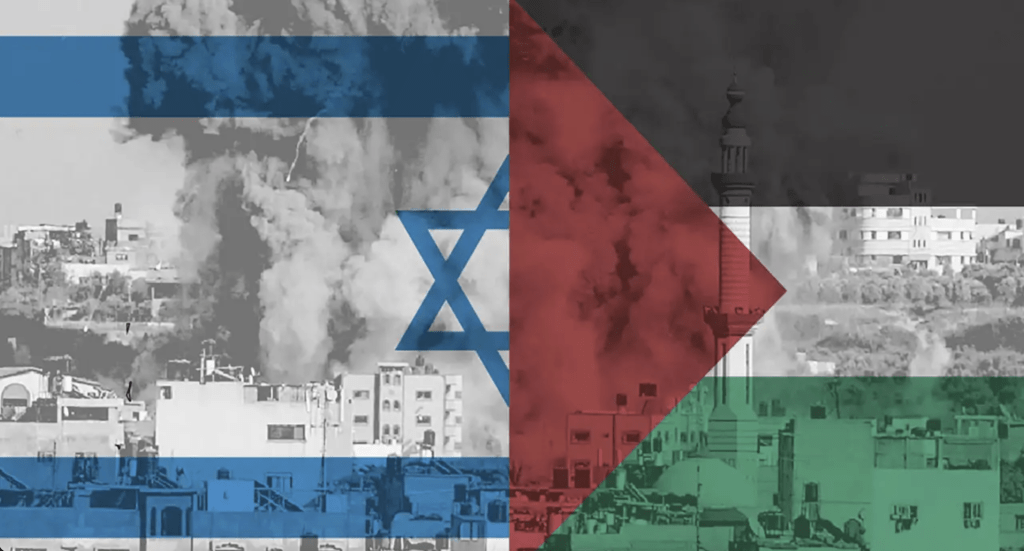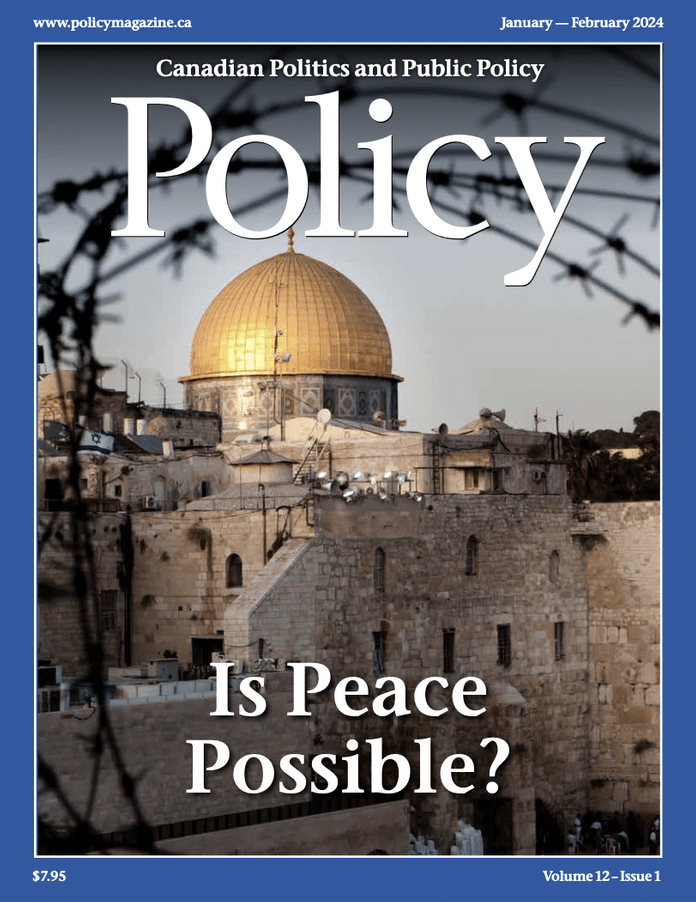Our Policy Middle East Coverage
 USA Today
USA Today
As the escalation in Middle East hostilities catalyzed by the Hamas massacres of October 7th, 2023, surges toward a regional war ahead of a US presidential election, we’ve gathered a selection of our Policy coverage of the story from the past year and beyond, beginning with our most recent opinion and analysis.
As Israel pivots the primary focus of its military campaign from Gaza to Lebanon — an escalation from either side of that border long conceptualized by analysts as the first step toward a wider conflict in the region — Benjamin Netanyahu’s interest in the outcome of the 2024 US presidential election has shifted from the subtext of this story to the context. Here’s Policy editor Lisa Van Dusen with The Complementary Biases of Benjamin Netanyahu: War, Trump and Autocracy.
Our Middle East Cover Package: Is Peace Possible?
In January 2024, we published our final print issue of Policy before shifting to online-only. That issue, which landed in the wake of the October 7th 2023, murderous Hamas rampage across the Negev that launched the Israel-Hamas war, was focused on how that latest escalation had impacted the prospects for a two-state solution and peace in the region. While much has happened in the region since January, the pieces provide useful big-picture context and insight, and, in some cases, have proven to be remarkably prescient.

Opening our cover package, former diplomat Jeremy Kinsman, who served as ambassador to Russia, to the European Union and to Italy, and as high commissioner to the United Kingdom, gave us an overview into how Israelis and Palestinians might move forward in, The Possibilities for Peace.
The late Prime Minister Brian Mulroney, in accepting the Herzl Award from the World Jewish Congress in New York in November, made an eloquent acceptance speech indispensable to our cover package. “Antisemitism, born in ignorance and nurtured in envy,” said the former prime minister, “is the stepchild of delusion and evil and is a scourge that must be eradicated.”
In Why, Once Again, Israel Will Survive, McGill history professor, US presidential historian Gil Troy, who lives mostly in Tel Aviv, conveyed the mood on the ground in the wake of “Israel’s 9/11”. “Now comes Israel’s unconventional thinkers’ greatest test,” writes Troy, “how not to lose the war you seem to have won by blowing the peace.”
In The Children of Gaza Deserve Peace, Policy Contributing Writer Aftab Ahmed described the terrible death toll among Palestinian children produced by Israel’s bombardment, and where it stood as a test of international humanitarian law.
Our regular contributors former Privy Council Clerk Kevin Lynch and former White House aide Paul Deegan erred eloquently on the side of moral clarity with, Canada’s Moment to Show Leadership on Antisemitism.
And, from Policy Editor Lisa Van Dusen, Israelis, Palestinians and Democratic Peace Theory, exploring how the hijacking of democracy on both sides has influenced outcomes.
In other Policy opinion and analysis
From April 2023, the timely — especially in retrospect — analysis from Munk School Distinguished Fellow Arif Lalani and former Canadian Diplomat Jim Mitchell, Now is the Time for Canada to Re-think Middle East Policy. “A new Middle East is taking shape,” wrote Lalani and Mitchell. “It’s time for Canada’s Middle East policy to catch up or risk being irrelevant.”
From March 2023, Lisa Van Dusen with a look at the political history and geopolitical factors informing Benjamin Netanyahu’s targeting of Israel’s supreme court. “As Tolstoy might have observed about the systematic global war on democracy of the past two decades,” writes Van Dusen, “‘All democracies are alike; each besieged democracy is besieged in its own way.’” Here’s Benjamin Netanyahu and the War on Democracy.
From October 2021, Van Dusen explores Lebanon’s economic and political crisis, which, with Hezbollah now firing missiles into Tel Aviv and Israel reportedly preparing a ground invasion into southern Lebanon, provides a sense of the country’s pre-existing governance and corruption issues as distinct from its bilateral relationship with Israel. Here’s Lebanon’s Chaos: Not Quite Déja-Vu.
From May 2021, Van Dusen looks back at a Palestinian experiment in de facto statehood that was doomed by its very success. “It required a leap of faith on the part of people trapped in a culture in which violence, resistance, hatred and imprisonment are normalized,” wrote Van Dusen, “to see both their occupiers and themselves differently.” Here’s Netanyahu’s No-State Solution and the Provocations of Peace.
From 2018, former Ambassador to Russia, the EU, Italy and former high commissioner to the UK Jeremy Kinsman looks at Donald Trump’s recognition of Jerusalem as the capital of Israel as a factor in the long-intractable peace process. Here’s Jeremy Kinsman with O Jerusalem! Sacred to Three Faiths, Capital of One?
In related Policy book reviews
Our Policy book reviewers bring a level of expertise and experience in the subject area of each book to their reviews, which makes our Policy Book Reviews analysis as well.
From Senator Peter Boehm, Policy contributor, career diplomat, Sherpa for multiple G7s, and chair of the Senate Committee on Foreign Affairs and International Trade, our review of Martin Indyk’s Master of the Game: Henry Kissinger and the Art of Middle East Diplomacy. Here’s Master of the Game: Henry Kissinger and ‘Balanced Dissatisfaction’ Nostalgia.
From McGill University history professor and US presidential historian Gil Troy, our review of Jim Torczyner’s Rights-Based Community Practice and Academic Activism in a Turbulent World. Here’s Fighting Poverty and Building Peace from Montreal to the Middle East.
From Lisa Van Dusen, former international news editor at UPI in Washington and AP in New York, former international news writer for Peter Jennings and former Communications Director for the McGill Middle East program in Civil Society and Peace Building, our review of Column McCann’s Apeirogon: A Novel. Here’s The Middle East, A Love Story: Apeirogon Unties the Knot of Israel/Palestine.
Visit us at Policy Online, where you’ll find our latest Policy Specials, Columns, Dispatches, Analysis, Book Reviews and Verbatim sections, plus The Week in Policy and all our posted print issues.
